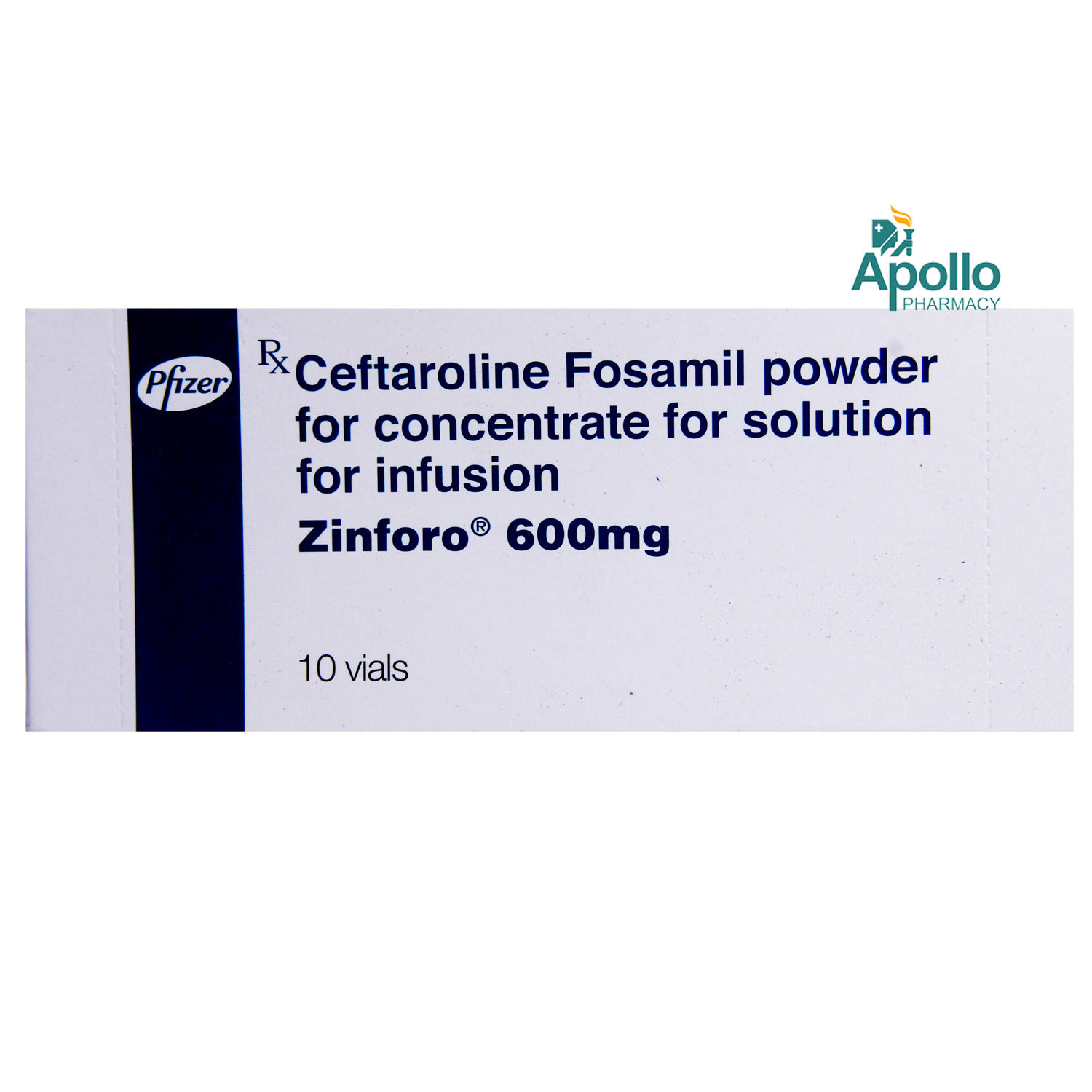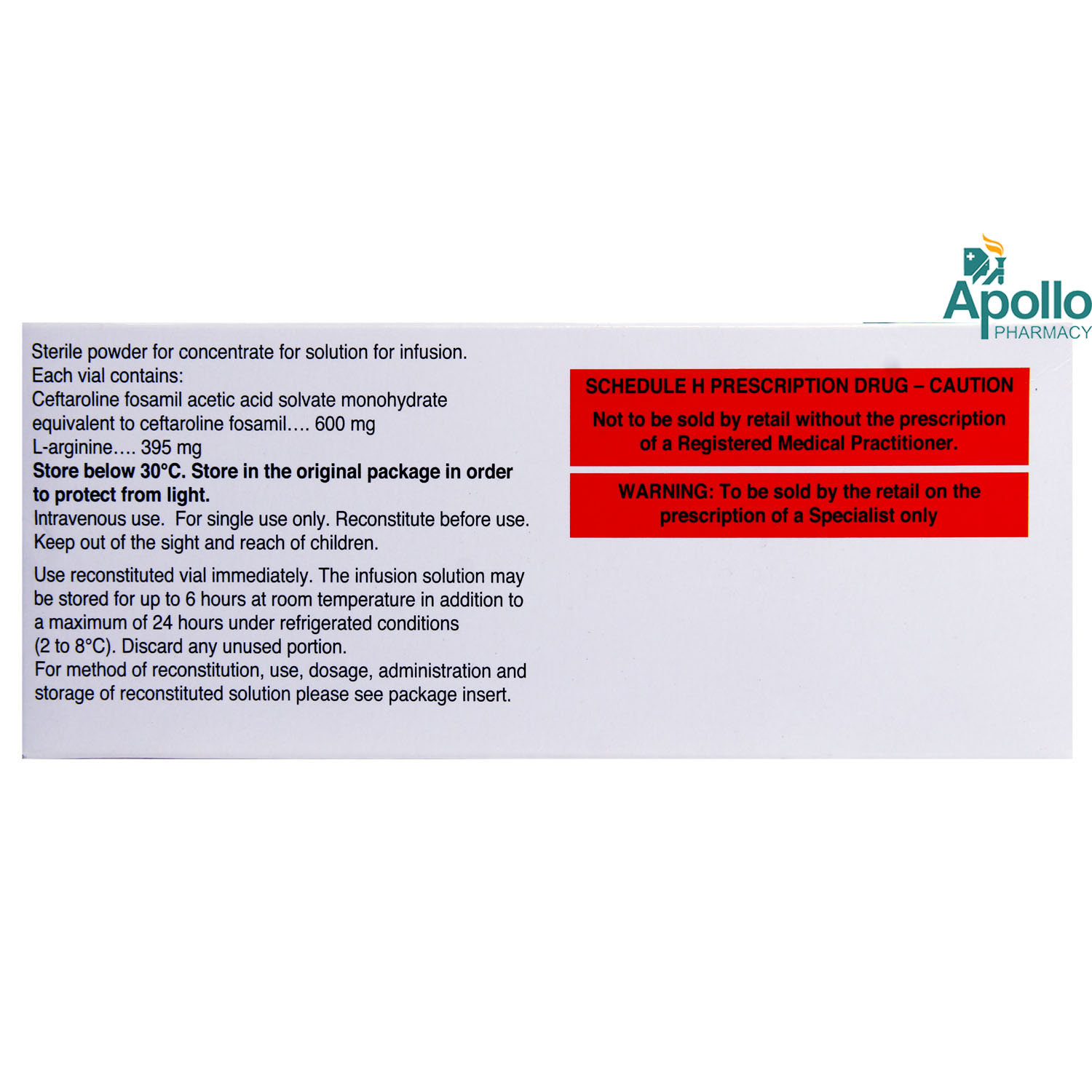Zinforo 600mg Injection 1's
MRP ₹3323.5
(Inclusive of all Taxes)
₹398.8 Cashback (12%)
Provide Delivery Location
Online payment accepted
 Prescription drug
Prescription drugWhats That
Composition :
Manufacturer/Marketer :
Consume Type :
Expires on or after :
Return Policy :
About Zinforo 600mg Injection
Zinforo 600mg Injection is an antibiotic medicine used in the treatment of bacterial infections. It is used in treating skin and skin structure infections and community-acquired pneumonia caused by bacteria. A bacterial infection occurs when harmful bacteria grow in the body. It can infect any part of the body and multiply very quickly.
Zinforo 600mg Injection contains Ceftaroline fosamil, belonging to the novel fifth-generation cephalosporin class of drugs. It works by inhibiting the synthesis of the bacterial cell wall (a protective covering) that is necessary for their survival and killing bacteria.
Zinforo 600mg Injection may cause certain side effects, such as diarrhoea, nausea, vomiting, headache, constipation, rash, abdominal pain, and pain at the site of injection. These side effects do not require medical attention and gradually resolve over time. Zinforo 600mg Injection is a parenteral preparation. A trained healthcare professional will administer it. Do not self-administer.
Zinforo 600mg Injection should be avoided if you are allergic to it or any other antibiotics of the same class. Let your doctor know about your complete medical history, other health problems, and your current medication, to rule out any side effects/interactions. Also, inform your doctor if you are pregnant or breastfeeding before receiving Zinforo 600mg Injection.
Uses of Zinforo 600mg Injection
Directions for Use
Key Benefits
Zinforo 600mg Injection contains Ceftaroline fosamil an antibiotic used In the treatment of bacterial infections. It is a broad-spectrum cephalosporin antibiotic that acts against both aerobic (grow in the presence of oxygen) and anaerobic (grow in the absence of oxygen) bacteria. Zinforo 600mg Injection works by inhibiting the synthesis of the necessary bacterial cell wall (a protective covering) for their survival. This causes damage to the bacterial cell wall and eventually leads to the death of the bacterial cell. Zinforo 600mg Injection is only effective in treating infections caused by bacteria and not effective for viral infections like flu or a common cold.
Storage
- Inform Your Doctor: Notify your doctor immediately about your diarrhoea symptoms. This allows them to adjust your medication or provide guidance on managing side effects.
- Stay Hydrated: Drink plenty of fluids to replace lost water and electrolytes. Choose water, clear broth, and electrolyte-rich drinks. Avoid carbonated or caffeinated beverages to effectively rehydrate your body.
- Follow a Bland Diet: Eat easy-to-digest foods to help firm up your stool and settle your stomach. Try incorporating bananas, rice, applesauce, toast, plain crackers, and boiled vegetables into your diet.
- Avoid Trigger Foods: Steer clear of foods that can worsen diarrhoea, such as spicy, fatty, or greasy foods, high-fibre foods, and dairy products (especially if you're lactose intolerant).
- Practice Good Hygiene: Maintain good hygiene to prevent the spread of infection. To stay healthy, wash your hands frequently, clean and disinfect surfaces regularly, and avoid exchanging personal belongings with others.
- Take Anti-Diarrheal Medications: If your doctor advises, anti-diarrheal medications such as loperamide might help manage diarrhoea symptoms. Always follow your doctor's directions.
- Keep track of your diarrhoea symptoms. If they don't get better or worse or are accompanied by severe stomach pain, blood, or dehydration signs (like extreme thirst or dark urine), seek medical help.
- Inform your doctor about the nausea and discuss possible alternatives to the medication or adjustments to the dosage.
- Divide your daily food intake into smaller, more frequent meals to reduce nausea.
- Opt for bland, easily digestible foods like crackers, toast, plain rice, bananas, and applesauce.
- Avoid certain foods that can trigger nausea, such as fatty, greasy, spicy, and smelly foods.
- Drink plenty of fluids, such as water, clear broth, or electrolyte-rich beverages like coconut water or sports drinks.
- Use ginger (tea, ale, or candies) to help relieve nausea.
- Get adequate rest and also avoid strenuous activities that can worsen nausea.
- Talk to your doctor about taking anti-nausea medication if your nausea is severe.
- Record when your nausea occurs, what triggers it, and what provides relief to help you identify patterns and manage your symptoms more effectively.
- Skin rash caused by allergies is due to irritants or allergens. Therefore, avoid contact with such irritants.
- Consult your doctor for proper medication and apply an anti-itch medication. Follow the schedule and use the medication whenever needed.
- Protect your skin from extreme heat and try to apply wet compresses.
- Soak in the cool bath, which gives a soothing impact to the affected area.
- Inform your doctor immediately if you experience a fever after starting a new medication.
- Your doctor may adjust your medication regimen or dosage as needed to minimize fever symptoms.
- Monitor your body temperature to monitor fever progression.
- Drink plenty of fluids, such as water or electrolyte-rich beverages, to help your body regulate temperature.
- Get plenty of rest and engage in relaxation techniques, such as deep breathing or meditation, to help manage fever symptoms.
- Under the guidance of your doctor, consider taking medication, such as acetaminophen or ibuprofen, to help reduce fever.
- If your fever is extremely high (over 103°F), or if you experience severe symptoms such as confusion, seizures, or difficulty breathing, seek immediate medical attention.
- Limit processed foods and eat more vegetables and fruits.
- Exercise at least 30 minutes every day.
- Maintain a healthy weight.
- Quit smoking as it can worsen kidney damage.
- Control your blood pressure and blood glucose.
- Limit salt intake and alcohol consumption.
- Avoid trigger foods that can cause allergic reactions, such as nuts, shellfish, or dairy products.
- Keep a food diary to track potential food allergens.
- Include omega-3 rich foods like salmon and walnuts to reduce inflammation.
- Wear loose, comfortable clothing made from soft fabrics like cotton.
- Apply cool compresses or take cool baths to reduce itching.
- Use gentle soaps and avoid harsh skin products.
- Reduce stress through relaxation techniques like meditation or deep breathing.
- Limit fruit intake to two servings a day, choose a low-potassium options like apples and strawberries.
- Restrict starchy vegetables like potatoes and pumpkin to half a cup daily.
- Avoid or limit foods like tomato products, high-bran cereals, and salty or sugary snacks.
- Limit dairy products to 200g of yoghurt or 300ml of milk per day.
Drug Warnings
Zinforo 600mg Injection should be avoided if you are allergic to it or any other antibiotics. Let your doctor know about your complete medical history, including current medication, to rule out any side effects/interactions. Before administration, inform your doctor if you have/had liver and kidney disease. Zinforo 600mg Injection is not recommended for use in children as safety is not established. If you are pregnant or breastfeeding, inform your doctor beforehand. Zinforo 600mg Injection is only effective in treating infections caused by bacteria and not effective for viral infections like flu or a common cold.
Drug-Drug Interactions
Drug-Drug Interactions
Login/Sign Up
Drug-Food Interactions
Drug-Food Interactions
Login/Sign Up
Diet & Lifestyle Advise
- Avoid taking too much calcium or iron-enriched foods, as it might affect the working of Zinforo 600mg Injection.
- Include more fibre-enriched food in your diet, as it can be easily digested by your gut bacteria, which helps stimulate growth.
- Fibre foods may help restore healthy gut bacteria after a course of antibiotics.
- Avoid or limit the consumption of alcohol and quit smoking.
Side Effects of Zinforo 600mg Injection
- Nausea
- Diarrhoea
- Stomach upset
- Fever
- Insomnia
- Abdominal pain
- Rash
- Injection site reactions
- Headache
- Pain at the site of injection
Habit Forming
Therapeutic Class
All Substitutes & Brand Comparisons
Author Details
We provide you with authentic, trustworthy and relevant information
Drug-Diseases Interactions
Drug-Diseases Interactions
Login/Sign Up
FAQs
Zinforo 600mg Injection contains Ceftaroline fosamil, which works by inhibiting the formation of the bacterial cell wall (a protective covering) that is necessary for their survival.
Zinforo 600mg Injection can cause diarrhoea as a side effect. Zinforo 600mg Injection is an antibiotic that kills toxic bacteria but can also affect the useful bacteria in your intestine or stomach, leading to diarrhea. If you have diarrhea that is watery or bloody, call your doctor. Do not use anti-diarrhea medicine unless your doctor tells you to.
No, Zinforo 600mg Injection is not used to treat viral infections. Zinforo 600mg Injection is an antibiotic that is used to treat only bacterial infections.
Drug-Drug Interactions Checker List
- AMIODARONE
- CLARITHROMYCIN
- CHLORAMPHENICOL
- RITONAVIR
- PHENYTOIN
- PHENOBARBITAL
- RIFAMPICIN
Disease/Condition Glossary
Bacterial infection: A bacterial infection occurs when harmful bacteria enter, grow, and infect the body. It can infect any part of the body and multiply very quickly. These infections vary from minor illnesses to severe brain infections like meningitis and encephalitis. When your child gets infected with these germs, they can experience generalized symptoms like fevers, chills, and fatigue. Children with a weak immune system are more prone to infections.
Community-acquired pneumonia: It is most commonly caused by the bacteria Streptococcus pneumonia. The name community-acquired is said when the infection is acquired outside the hospital. Symptoms include cough, heavy sputum, shortness of breath, fever, and chills. The risk factors are smoking, age above 65 years, alcoholism, and a weak immune system.

Have a query?
Alcohol
Safe if prescribed
It is unknown whether Zinforo 600mg Injection will interact with alcohol or not. Hence, consult your doctor if you have any concerns.
Pregnancy
Consult your doctor
Limited data is available on the effect of Zinforo 600mg Injection in pregnancy. Hence, if you are pregnant or planning pregnancy, inform your doctor before receiving Zinforo 600mg Injection. Your doctor may prescribe this medicine if the benefits outweigh the risks.
Breast Feeding
Consult your doctor
Limited data is available on the effect of Zinforo 600mg Injection on breastfeeding. Hence, if you are a nursing mother, inform your doctor before receiving Zinforo 600mg Injection. Your doctor may prescribe this medicine if the benefits outweigh the risks.
Driving
Safe if prescribed
Zinforo 600mg Injection may cause unwanted effects like dizziness and affect your capacity to drive a vehicle or operate machinery.
Liver
Consult your doctor
If you have a pre-existing or a history of liver disease, inform your doctor before receiving Zinforo 600mg Injection. Your doctor may adjust the dose of this medicine or prescribe a suitable alternative based on your condition.
Kidney
Consult your doctor
If you have a pre-existing or a history of kidney disease, inform your doctor before receiving Zinforo 600mg Injection. Your doctor may adjust the dose of this medicine or prescribe a suitable alternative based on your condition.
Children
Safe if prescribed
Zinforo 600mg Injection is not recommended for use in children as the safety and efficacy are not established.







.jpg?tr=q-85)

